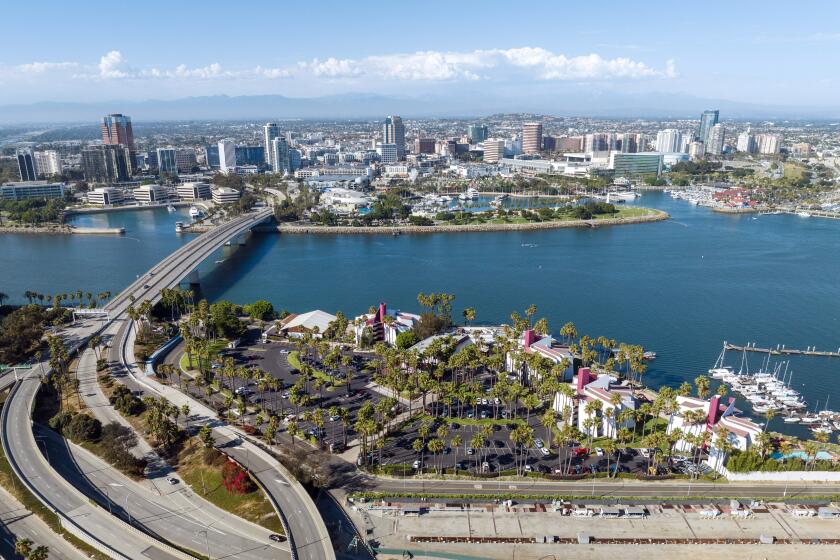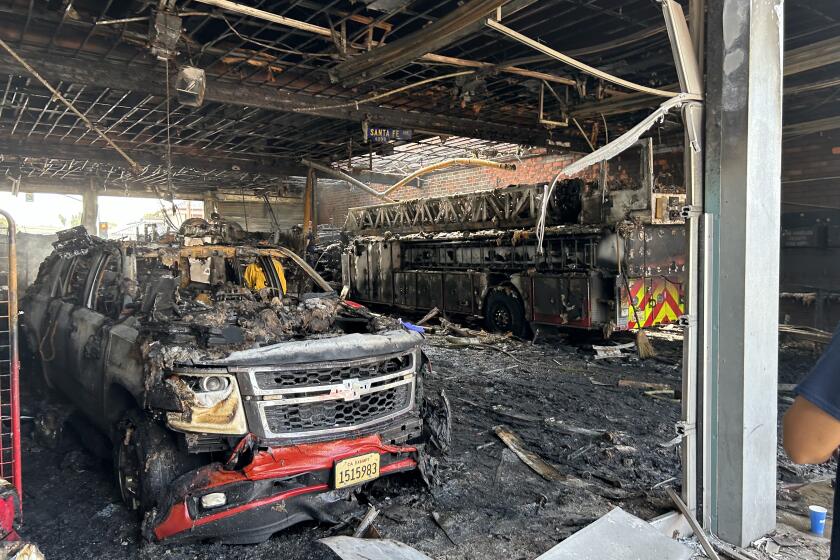Brentwood Road Bloc : Communities: Residents of enclave near the Getty Center receive tentative City Council approval to erect gates.
In an action that runs contrary to recent court rulings prohibiting some gatedcommunities, the Los Angeles City Council has tentatively agreed to allow about 90 homeowners to block off their tiny Brentwood neighborhood from visitors and nearby residents.
The community is a quiet, upscale enclave just north of Sunset Boulevard, above the San Diego (405) Freeway. Residents plan to erect gates on Sunset, closing off the northern ends of Fordyce and Downes roads, and Gunston, Woodburn and Layton drives.
The entrance to the compound, planned at Woodburn and Sunset, would be guarded. There would be exits at Layton and Gunston drives.
The council in February approved a plan to vacate Brentwood Circle--giving its residents the responsibility for maintaining the streets, which no longer would be public. The council is scheduled on May 31 to hold a public hearing on the plan, which has the support of the district’s councilman, Marvin Braude. Pending final approval, the gates could be erected by the end of the year.
The vices and virtues of gated neighborhoods have long been debated in communities, council meetings and state courts. The council’s approval of the Brentwood proposal comes a year after two state courts rejected a plan to gate a neighborhood near the Hollywood Bowl.
If the council approves the Brentwood proposal, it would be unique in Los Angeles, said Louie Yamanishi, acting division engineer for the land development and mapping division of the Department of Public Works.
No other community in Los Angeles has been gated--with its streets turned over to the neighborhood--after houses and roads have been developed, he said.
There are 13 gated communities in the city, but most followed agreements made with housing developers before construction started, Yamanishi said.
Brentwood residents have been working on the plan for nine years--ever since the Getty Trust announced plans to build Getty Center in the hills north of the neighborhood. The homeowners are convinced that visitors to the Getty, scheduled to open in 1997, will use their neighborhood as a shortcut to the museum.
While the Getty Center property is connected to Brentwood Circle and appears to be accessible through the neighborhood, the museum complex is separated by a gate that has no public access. Still, that has not deterred some from trying; several construction workers at the Getty Center have tried to cut through the area, said Steve Rountree, director of operations and planning for the Getty Trust.
“That’s how this whole thing started, when we realized that the Getty would be right above us and people would be getting off the freeway here,” said Linda Trope, a 30-year-resident of Layton Street. Trope has been actively involved since the idea of erecting a gate was proposed.
Other residents noted the obvious benefits of living in a gated community: greater security and the prospect of increased property values. One resident even referred to the council’s action as a windfall for the neighborhood.
“We’re delighted,” said Mona Bonelli, 92, who has lived in the neighborhood for 20 years. “Everyone who gets lost [on Sunset] comes up here. The guards at the gate will keep out the riffraff.”
Such sentiments fuel the fire of critics who argue that gated communities are not just exclusive, but exclusionary.
“I’m philosophically opposed to them,” said Councilwoman Jackie Goldberg. “There should be a compelling reason to approve a gated community.”
Added Howard Gantman, press secretary to Councilwoman Rita Walters: “Putting up barriers Balkanizes and separates the city.”
Before it closes off the neighborhood, Goldberg said, the city should first try to put up signs on Sunset notifying motorists that the streets of Brentwood Circle will not lead to the Getty Center.
“It’s premature,” Goldberg said. “We don’t even know if there will be a traffic problem.”
The debate over gated communities in California is not just a philosophical one. Many open-space advocates consider some gated communities illegal, prompting a spate of court cases.
The greatest controversy has been generated by gated communities that cut off people from streets that remain in the public domain. Slightly less problematic have been neighborhoods, such as Brentwood Circle, that agree to privatize the streets and alleviate city taxpayers from paying for street services.
Though the Brentwood proposal has passed the council with relatively little fanfare, gated communities have inspired lawsuits in communities throughout the state. One such precedent-setting case was heard by two courts in Los Angeles.
In 1993, the Los Angeles Superior Court refused to allow Whitley Heights, located near the Hollywood Bowl, to be gated as a deterrent to crime. The decision came after the Los Angeles City Council in 1991 approved the gates and permitted the streets to remain public.
After the council’s action, residents just outside the gates sued the city. Last year, Whitley Heights homeowners lost the case on appeal in the state Supreme Court.
Brentwood Circle residents point out that, unlike the proposal in Whitley Heights, they would take care of the streets. The Getty Museum will help the residents pay for the construction of the gates, said Rountree of the Getty Trust.
The residents estimate that it will cost them $200 to $300 a month to maintain the streets and pay for the gatekeepers. In addition, the Brentwood homeowners already have paid Los Angeles about $40,000 to process the request.
But the out-of-pocket expense of their efforts has not fazed Goldberg.
“I shouldn’t need a hall pass to go into other neighborhoods,” she said.
More to Read
Start your day right
Sign up for Essential California for news, features and recommendations from the L.A. Times and beyond in your inbox six days a week.
You may occasionally receive promotional content from the Los Angeles Times.






